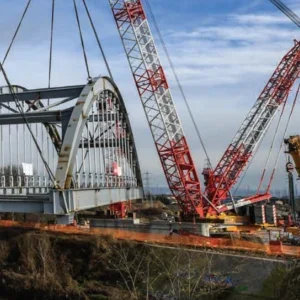This summer, Jim Robertson, CEO of General Crane USA, together with a group of supporters and consultants, successfully lobbied to change the law on workers’ compensation lawsuits brought by construction site workers. He expects insurance premiums to drop by about 16% when the law comes into effect this January.

Jim Robertson, CEO of General Crane of Pompano Beach, Florida
The issue at the heart of the new law is ‘horizontal immunity’ – whether one contractor on site is immune from suits brought by an employee of another contractor in the event of an accident. Under the new law, horizontal immunity is reinstated, provided that the contractor has workers’ compensation insurance for its own employees and that its own gross negligence is not a major contributing factor in the accident, according to attorney Gary Hellman, special counsel to the FCOC, partner of law firm Goldman & Hellman (not Gordon & Hellman, as reported last month) and author of the legislation.
‘The lawsuits were ridiculous,’ Robertson tells Cranes Today. ‘It was the new Florida Lotto. I used that when testifying at committees in Tallahassee. Guys go out, fake an injury – forget fraud. We’d lose – we had no legal defence. Everybody above us was protected. I couldn’t take it anymore. It became one bedrock of the Florida Crane Owners Council [FCOC]. We needed someone to represent us. Everybody in construction organisations, like plumbers, has someone to represent them. We were getting pounded, because we had big insurance policies, and had one or two guys on site in a big crane.
‘We had the state department of transport come to Orlando to see us. We got to be somebody real quick. We have a voice; it’s a lot bigger than our membership numbers. We did that in three years.’
After forming the FCOC, he brought together an insurance expert, a few lawyers, a colleague from the FCOC and a representative of the construction trade body Associated Builders & Contractors [ABC] to study the law. ‘We saw that this isn’t supposed to be this way, that we were getting screwed. Then we made a plan and hired a lobbyist. We hired those that believed in this.’
Robertson says that his relationships in the industry helped attract supporters. ‘I knew where to go. I had friends in different associations. I had believers. The lobbyists believed in it. I was the state president of the ABC in ’96. I felt that we had some friends in the Senate and in the House, that the governor was our friend, that it was time for business to win.’
Belief helped too. ‘It’s a principle. How can you take this kind of hit? It was a common goal, I don’t care what enterprise you work for. I don’t care if you work at Burger King.’ And he raised money to pay for those who wouldn’t work for free. ‘We used the ABC to raise $260,000. It takes money.’
Still, the first year of campaigning, in 2002, was in vain. He describes how he felt then: ‘I was broken. It wasn’t the year to be able to do it. It hurt. I pounded the system. But we weren’t ready. People weren’t succeptible. I kept synergy, I kept group, and we fought. Then it became our year, it became the year [Florida governor Jeb] Bush and others were willing to make a stab rectifying the situation. He pushed for it. This year we lost in regular session. The Senate couldn’t get it done. It was back and forth, it was war. Finally we got there. The governor invoked a special session. I got called 5pm one night, and had to be up there by 7:30am. We went and campaigned, day after day, testifying before banking and insurance committees. It never stopped. We met with legislators after the session. It was an awesome experience. It’s what it takes to win. A lot of people didn’t believe in us. There were lots. That’s another reason why victory tastes so sweet.
‘Now we’re going to become something important. If we aren’t able to prosper, our employees will never prosper. That’s the opposite of what liberal attorneys say. We will employ more by having a fair system. We’re taking it to the next level. We’ll defend it. We’ll go on and find new ways of promoting business. We’re setting up a business roundtable.’
Robertson says that the change in the law – which only applies to the state of Florida – could be picked up by crane operators in the rest of the USA. ‘It should spread if people wake up. You can’t rely on associations to do it, or lobbyists. Business had to do it. We had to lobby. You have got to have some balls. If you let the insurance company handle it, your accountant handle it, you’ll lose. You have to be proactive. It’s business. Others are trying not to do what’s important because of self interest.’
Reflecting on the campaign, Robertson says that it changed him. ‘It made me stronger. Absolutely. I like my new friends. We’ve made some. I feel like we can attack other things. We can face them, challenge them and conquer them – whether through the Florida Crane Owners Council or through my company. It made me appreciate the system differently. I believe, I guess, that we can get there, that there’s a future. We’ll work on it.’






